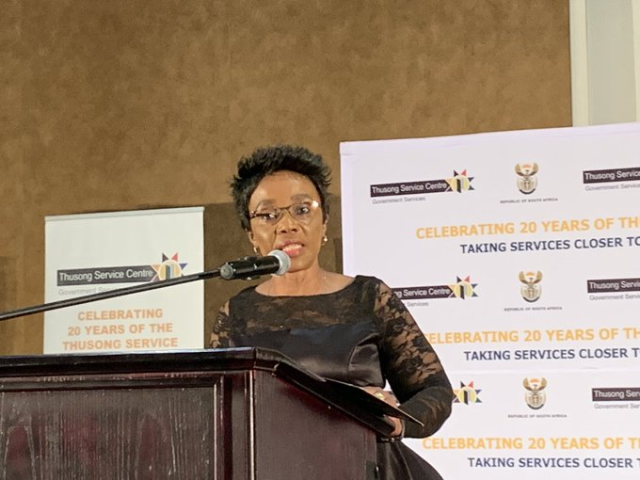Driving Inclusive Transformation in Finance: A G20 Call to Action
Speaking in Johannesburg on Monday, the Minister emphasized that financial inclusion is not a privilege but a fundamental right—a key enabler of economic freedom, social dignity, and equity.

- Country:
- South Africa
In a powerful address at the Group of Twenty (G20) Breakfast-Round Table on the Empowerment of Women and Disability Inclusion in the Banking Sector, South Africa’s Minister in the Presidency for Women, Youth and Persons with Disabilities, Sindisiwe Chikunga, issued an impassioned appeal to the banking sector to actively reshape its systems and structures to uplift the marginalised.
Speaking in Johannesburg on Monday, the Minister emphasized that financial inclusion is not a privilege but a fundamental right—a key enabler of economic freedom, social dignity, and equity. With South Africa currently holding the G20 Presidency (December 2024 to November 2025), this intervention marked a pivotal moment in the country’s international leadership under the theme: “Solidarity, Equality and Sustainability.”
The Current Crisis of Financial Exclusion
Chikunga shed light on the stark disparities in financial access, particularly for women in South Africa and beyond. Many women still lack access to basic financial services, including personal bank accounts, credit facilities, and investment tools.
“This exclusion is even more pronounced for women with disabilities, those in rural areas, young women, and informal workers,” she stated. The Minister underscored that the time had come to challenge this persistent inequality and ensure no one is left behind in the country’s financial evolution.
Transforming the Financial Landscape
Calling on banks and financial institutions, Chikunga urged the sector to reimagine financial systems to ensure they are accessible and empowering to underserved groups. This includes:
-
Developing tailored financial products for women’s lived realities.
-
Supporting women entrepreneurs, especially in micro and small enterprises.
-
Investing in digital literacy, infrastructure, and accessible technologies for women and persons with disabilities.
-
Incentivising financial inclusion through policy innovation and regulatory frameworks.
“Banks must shift from passive service delivery to becoming proactive partners in socio-economic development,” she declared.
Care Economy as a Growth Engine
A key highlight of the Minister’s speech was the framing of the care economy not as a welfare burden but as an economic multiplier. “Investment in caregiving infrastructure boosts employment, improves wellbeing, and enables women to fully participate in the economy,” she explained.
She called for bold financial models and inclusive innovation that amplify these multiplier effects, particularly through targeted investments that benefit women and persons with disabilities.
G20 Empowerment of Women Working Group: Key Priorities
Chikunga also shared insights into the G20 Empowerment of Women Working Group (EWWG), which is championing three urgent global priorities:
-
Strengthening the care economy
-
Expanding women’s financial inclusion
-
Combating gender-based violence and femicide
Under South Africa’s leadership, the EWWG is developing legacy empowerment programmes designed for sustainable impact and partnership with public and private sectors worldwide.
New Legacy Projects: Women Industrialists and Disability Inclusion
As part of these initiatives, the Ministry has designed Transformative Emerging Industrialists Accelerator Programs to support women-led innovation in strategic sectors such as:
-
Energy security
-
Maritime and defense industries
-
Aerospace
-
Agriculture
-
Digital platform economies
These programs will provide support from ideation to commercialisation and include mentorship, financing, market access, and product development.
In parallel, the government is advancing an ambitious disability inclusion legacy project: the establishment of a Disability Inclusion Nerve Centre. This centre is intended to be a cornerstone for regional advocacy, policy innovation, and practical implementation of disability rights.
Strategic Objectives of the Disability Inclusion Nerve Centre
The centre’s work will include:
-
Conducting research on disability rights integration in financial systems, AI, climate change, and labor policy.
-
Establishing a national disability data observatory to strengthen evidence-based planning.
-
Improving data reporting systems across sectors.
-
Developing early childhood disability screening protocols.
-
Enhancing institutional capacity with stronger disability focal points.
-
Leveraging artificial intelligence (AI) for better inclusion and education.
-
Supporting special schools to bridge the digital divide and foster better learning outcomes.
-
Creating a model inclusive classroom and school as a national benchmark.
A Call for Partnership and Innovation
The Minister concluded with a rallying call: “Together, let’s explore practical strategies, share success stories, break barriers, challenge stereotypes and fast-track the development of financing models that unlock the full economic potential of women and persons with disabilities.”
She reaffirmed South Africa’s commitment to inclusive economic transformation through partnership with the banking sector, civil society, international allies, and the broader private sector.
This G20 dialogue is a decisive step toward building a future where financial systems are equitable, inclusive, and intentionally designed to empower all citizens.










